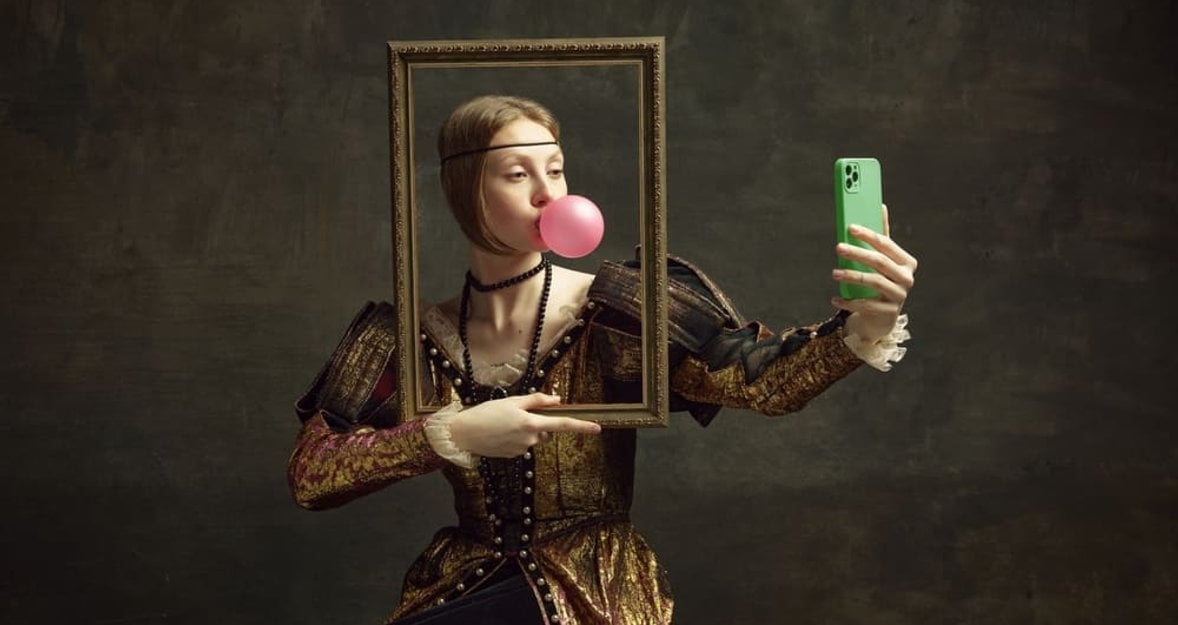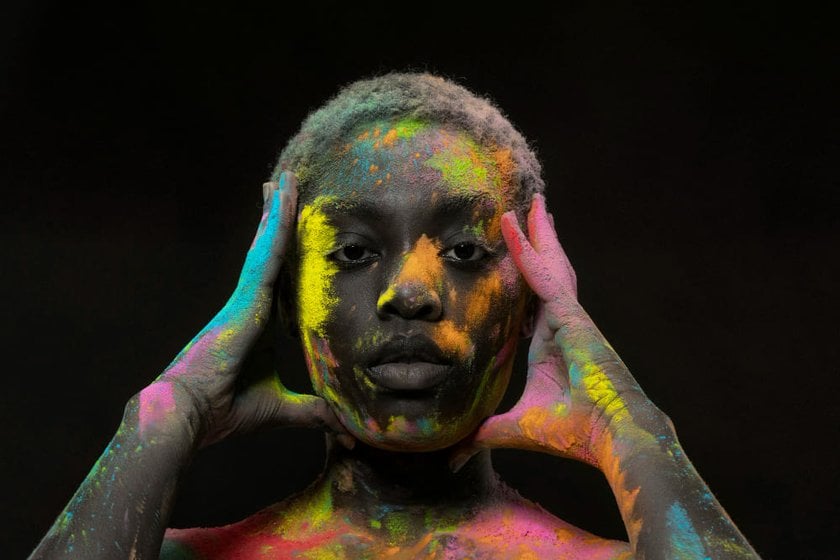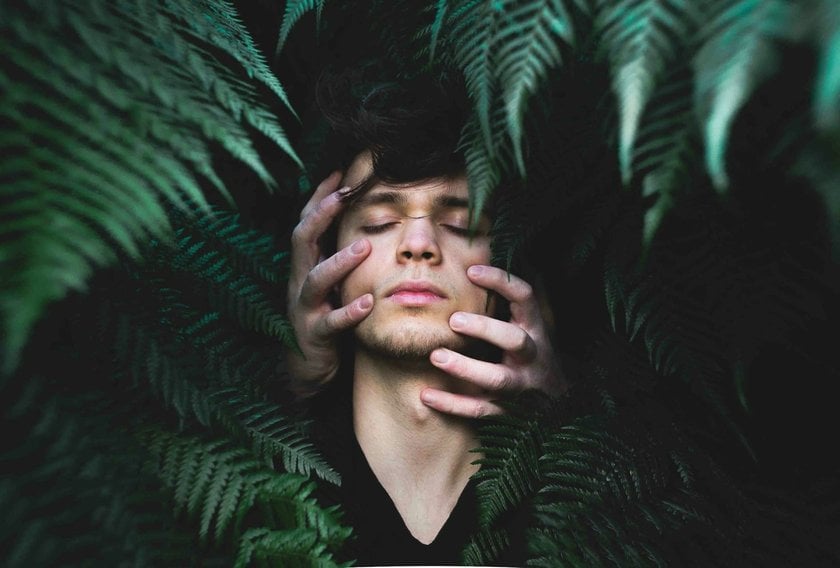Art Portrait Styles: Find Your Perfect Photographic Voice
September 03, 2024

This post explores various artistic portrait styles and offers tips and inspiration to help photographers elevate their work beyond traditional photos! It will spark your creativity and give you practical ideas to create more impactful and expressive portraits!
When you hear the word "portrait," you might picture someone standing straight in front of a neutral backdrop, trying their best serious face. But let's shake that image up a bit!
Artistic photography portraits offer a canvas for creativity far beyond the traditional. By stretching your imagination and experimenting with new art portrait styles, you can enhance your skills and truly capture the essence of your subjects.
Get ready to be inspired by interesting styles and unleash your inner creator!
What Makes a Good Portrait
 A good portrait must have a perfect combination of technical details like lighting, settings, and composition, but it should also convey the emotion of the person. You don't want to create a photo that will evoke no reaction from viewers, you want to capture a photograph that makes people feel something when they look at it!
A good portrait must have a perfect combination of technical details like lighting, settings, and composition, but it should also convey the emotion of the person. You don't want to create a photo that will evoke no reaction from viewers, you want to capture a photograph that makes people feel something when they look at it!
Why Explore Beyond Traditional Styles
 Mastering traditional portraits is important as it gives you the basics you need. But to really grow your skills, it's great to experiment and try new things!
Mastering traditional portraits is important as it gives you the basics you need. But to really grow your skills, it's great to experiment and try new things!
This can help you discover new styles you might not have thought of before. Also, exploring beyond traditional portraits allows you to highlight what makes someone unique. For example, if you're photographing someone who loves fishing, you could include fishing rods and fish in your setup. This personal touch can showcase their personality in a way that a standard portrait might not!
50mm vs 85mm: which one to choose for portrait photography?
Learn moreTypes of Creative Portrait Styles
Here’s a look at some creative styles that can inspire your next project:
Fine Art Portrait

Fine art portrait photography is where photographers express bold, artistic visions. This style often attracts clients like celebrities who seek aesthetically pleasing images for their portfolios, though anyone is welcome to try it. Fine art involves careful planning and a creative approach, using visual tricks and unconventional narratives to enhance the final image's beauty and impact!
Examples of Male and Female Fine Art Portrait Photography:
Historical Style: Inspired by classical paintings, these portraits use period costumes and dramatic lighting to give both men and women a timeless, elegant look.
Modern Abstracts: This approach features unusual poses, bold contrasts, and contemporary fashion, highlighting the individuality of the subject.
Nature-Infused: Using natural settings, such as forests or stark landscapes, these photos add depth and mood, enhancing the emotional connection with the subject.
Glamor Portrait
 Glamor portraits are popular among women of all ages who want to project confidence and express sensuality in an artistic manner. These shots emphasize makeup, hair styling, and wardrobe to enhance the subject's appearance and confidence.
Glamor portraits are popular among women of all ages who want to project confidence and express sensuality in an artistic manner. These shots emphasize makeup, hair styling, and wardrobe to enhance the subject's appearance and confidence.
To make a glamor shot even more attractive and professional, you can add a filter to the photo! Filters can enhance the overall mood, smooth out skin tones, and add a polished, cohesive look to the image, making it stand out even more!
Boudoir photography, a subset of glamor portraits, allows for even more artistic expression through intimate and sometimes sensual settings, often in bedrooms where subjects can comfortably express their passionate sides!
Candid Portrait
 Candid photography captures natural, unscripted moments. This style requires readiness and a bit of luck to catch genuine expressions and events as they unfold.
Candid photography captures natural, unscripted moments. This style requires readiness and a bit of luck to catch genuine expressions and events as they unfold.
What techniques might be useful? For example, continuous shooting during preparations or using humor to elicit spontaneous laughter can help capture these fleeting moments, making each candid portrait unique and lively!
Surreal Portrait

Surreal portraits challenge photographers to push their creative boundaries. The aim is to create dream-like images that transport viewers to otherworldly scenes, blurring the lines between reality and fantasy.
Achieving this effect involves meticulous scene setup, advanced editing skills, and often significant post-production work to add special effects and perfect the surreal atmosphere.
Here are some tips and ideas to help you create your own surreal portraits:
Going Underwater: Photographing subjects underwater can create a dream-like atmosphere, where everything moves more slowly and feels otherworldly.
Removing the Face: By digitally removing a subject's face, you can create a mysterious and unsettling image that makes people stop and think.
Resizing Objects: Play with the size of the objects in your photo. For example, make flowers bigger than the person to create a scene that feels out of proportion and surreal.
Using Light and Shadow: Experiment with strong contrasts of light and shadow to create mysterious and dimensional portraits that keep viewers guessing.
Creating Portals: Edit your photos to make a door or window appear as if it leads to another world, adding a fantastical element to your portraits.
Playing with Food: Alter everyday items, like turning a cake into something unexpected, to create images that surprise and confuse the viewer.
Resizing People: Change the size of your subject in post-production to make them appear unusually small or large, creating a striking and surreal effect.
Motion Blur: Use motion blur to distort the image, adding a dreamy or eerie quality that enhances the surreal feel.
Forced Perspective: Use perspective tricks to create illusions, like making a person appear next to an enlarged moon, making the scene feel unreal.
Conceptual Portrait
 Conceptual portraits use abstract imagery to communicate specific messages or themes. Although these images might be challenging for viewers to interpret, they powerfully reflect the photographer’s vision. Conceptual photography encourages limitless creativity and careful attention to detail in both the shooting and post-processing stages to achieve a compelling narrative and visual impact!
Conceptual portraits use abstract imagery to communicate specific messages or themes. Although these images might be challenging for viewers to interpret, they powerfully reflect the photographer’s vision. Conceptual photography encourages limitless creativity and careful attention to detail in both the shooting and post-processing stages to achieve a compelling narrative and visual impact!
How to Come Up with an Idea for a Conceptual Portrait
Decide What You Want to Express: Think about the message or feeling you want your picture to convey. It could be something personal, like an emotion you're experiencing, or a broader theme, like a social issue you care about.
Draw from Personal Experiences: Consider your own life experiences and emotions as a source of inspiration. Using something meaningful to you can make your photograph more authentic and powerful.
Look for Inspiration in Art and Literature: Explore works of art, books, or movies that resonate with you. Think about how you can take themes or ideas from these sources and represent them in your portrait.
Explore Abstract Ideas: Abstract concepts like time, identity, or freedom can provide great inspiration. Consider how you might visually depict these ideas in your portrait.
Use Symbols and Metaphors: Think about objects or scenes that could symbolize your idea. For example, a cracked mirror might represent a fractured identity, or a person holding a clock could symbolize the pressure of time.
Sketch Your Thoughts: Sometimes, drawing out your ideas can help you see them more clearly. Make simple sketches of different concepts and see which one feels right.
Collaborate with Your Subject: If you're photographing someone else, talk to them about the concept. Their input can help shape the idea and make the portrait more meaningful.
Let the Idea Evolve: Your concept might change as you start planning the shoot, and that’s okay. Be open to new ideas and let the concept grow as you explore different possibilities!
The History Guide to Portrait Styles: 10 Types of Portrait Photography
Learn moreEach of these styles offers photographers a way to explore their creativity and technical skills while providing clients with distinctive, memorable images that go beyond traditional portrait photography!
Creative Editing
As you might have guessed, art portraits often involve a fair amount of post-processing to achieve that perfect look. One of the most useful tools you can use is an AI portrait editor like Luminar Neo. It offers a wide range of features specifically designed for portrait enhancement, and the best part is that you can see the results in just a few seconds!
Another great way to transform a plain photograph into something eye-catching is to remove the background from the portrait. Once the background is removed, you can replace it with something that better suits the mood or theme of the photo, instantly elevating the overall impact of your portrait!
Remove Portrait Background in One Click with Luminar Neo
TRY IT NOW!Conclusion
We hope this post has helped you see portrait photography in a new light and inspired you to explore creative styles. Now that you're equipped with fresh ideas, it's time to dive in and experiment!
Enjoy the journey of creating something unique, and we look forward to seeing the art portraits you bring to life!





